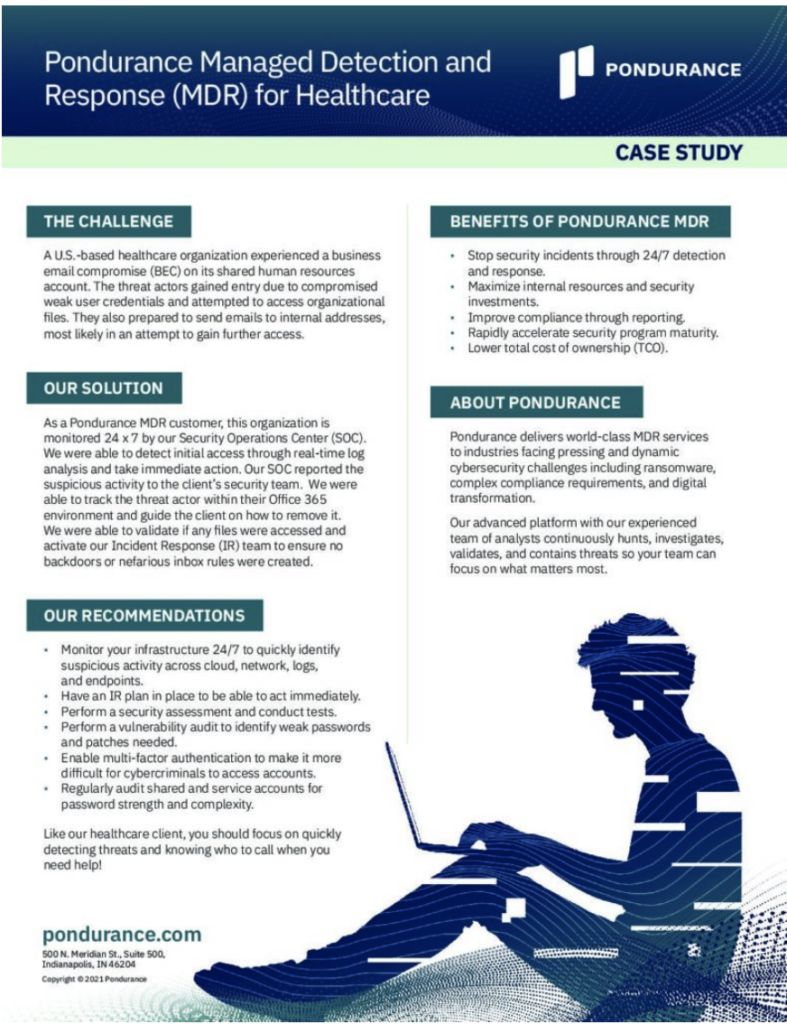Our privacy policy is located here.
Risk-Based Cybersecurity for Healthcare Providers
So your cybersecurity program focuses on what's most important, and you can focus on patient care.
Case Studies
Incident Response (IR) for Healthcare

We thought we had been making the right security investments. Then we had an incident and brought in Pondurance. They immediately proved their value and earned our trust due to their immense expertise and guidance throughout the entire process. We simply wouldn‘t have been successful without them.
Steve Long, President and CEO, Hancock Health
Webinar
Achieving Optimal Cybersecurity ROI

New HIPAA regulations in 2022
Are you keeping up with HIPAA regulations? Check back often for the latest updates.
Practical Cybersecurity: A Road Map for Your Healthcare Organization

Protecting your healthcare organization is an ongoing process, and it requires careful planning. But with the right people, technology and policies in place, you’re more likely to find and fix vulnerabilities, detect and thwart threats and avert disaster. Getting there isn’t necessarily easy, but you don’t have to do it alone. This eBook can help you cut through the clutter, complexity and confusion.
Xtelligent research
Latest News and Resources
Dwell Time Can Impact the Outcome of a Cyberattack
A long dwell time gives bad actors more opportunity to access sensitive electronic protected health information, infiltrate financial accounts, and introduce malicious malware. But there are steps healthcare organizations can take to detect and prevent dwell time in their networks including threat hunting and integrated incident response. READ BLOG
Legislators Take Steps To Enhance Cybersecurity in Healthcare. Will It Help?
The Healthcare Cybersecurity Act of 2022 was introduced in the U.S. Senate on March 23. The proposed bill aims to enhance the cybersecurity of the healthcare and public health sectors with new healthcare cybersecurity regulations. READ BLOG
Cybersecurity for Healthcare
Cybersecurity for the healthcare industry is an increasingly crucial aspect of modern medical practices. As healthcare providers and facilities continue to rely on technology for record-keeping, communication, and patient care, the need for robust cybersecurity measures has never been more apparent. This growing industry seeks to protect sensitive patient information, ensure the integrity of medical processes, and safeguard against potential cyber threats that could compromise essential services. One area of focus within cybersecurity healthcare entails securing electronic health records (EHRs) and other digital storage systems. These repositories contain vast amounts of personal and medical information about patients, making them attractive targets for data breaches and cyberattacks. By implementing advanced encryption methods and access controls, cybersecurity professionals in the healthcare industry can help mitigate these risks.
Cybersecurity in the healthcare industry also involves safeguarding connected medical devices used daily in hospitals and clinics. These tools are often connected to networks or even the internet, leaving them vulnerable to hacking attempts or malware infections. In response to this threat, cybersecurity specialists work with device manufacturers to develop secure firmware updates, patches, and other protective measures that can be applied throughout a device’s lifecycle.
Cybersecurity for hospitals and healthcare facilities extends beyond protecting critical infrastructure such as EHR systems and connected devices. It also encompasses network security measures designed to thwart attacks on hospital IT systems or websites that may expose sensitive information or disrupt vital services. Implementing multi-factor authentication processes for employees accessing critical systems is one example of how these facilities can bolster their defenses against cyber threats.
Numerous companies offer specialized cybersecurity services for healthcare organizations to address these complex challenges faced by hospitals and clinics worldwide. These services may include risk assessments, employee training programs, and ongoing monitoring of a facility’s cybersecurity posture. Services for cybersecurity for healthcare providers can continue to deliver life-saving care while maintaining the trust and privacy of their patients in an increasingly digitized world.
Cyber Threats in Healthcare
The rise of these recent cyber attacks on healthcare can be attributed to the sensitive and valuable nature of patient data, coupled with the digitalization of medical records and systems. Healthcare providers need to be aware of these risks and take appropriate measures to protect their patients’ information. External threats to healthcare organizations are numerous and varied. Some examples include phishing attacks, ransomware, and data breaches caused by hackers exploiting vulnerabilities in software or networks. Healthcare cyber attacks are anticipated to increase in frequency in the future, increasing the need to prioritize cybersecurity measures.
Ransomware in healthcare is a particularly prevalent threat, with attackers encrypting vital files or systems and demanding payment for their release. Phishing in healthcare is another significant issue faced by organizations. By impersonating trusted entities through emails or other communication methods, attackers can deceive employees into revealing sensitive information or downloading malware onto organizational systems. Healthcare data breach examples serve as cautionary tales for providers seeking to safeguard themselves against similar occurrences. Security breaches in healthcare within the last three years have resulted from various causes, such as human error, weak passwords, and outdated software. The largest healthcare data breaches often involve millions of records being compromised and can lead to substantial financial losses for organizations as well as severe damage to their reputations.
Impact of Cyber Attacks on Healthcare
The impact of cyber attacks on healthcare is a growing concern as the digitalization of medical records and healthcare systems becomes increasingly prevalent. Healthcare cyber attacks can potentially compromise patient information, disrupt hospital operations, and even threaten patients’ lives. In order to understand the gravity of this issue, it is essential to examine healthcare cyber attacks examples, delve into healthcare cyber attacks statistics, and assess the potential risks and threats to electronic security in healthcare systems. All this data demonstrates the massive impact cyber attacks can have on the healthcare space.
The potential threats in the healthcare industry include:
- Unauthorized access to sensitive patient information
- Disruption or manipulation of critical medical devices
- Damage or destruction of computer systems
- Financial losses due to fraud or extortion schemes
- Loss of patient trust in medical institutions
The impact of cyber attacks on healthcare is a pressing issue that requires urgent attention from policymakers, hospital administrators, and cybersecurity professionals. A comprehensive approach to electronic security must be adopted to protect sensitive patient information, ensure the smooth functioning of medical facilities, and ultimately safeguard the lives of patients who depend on these vital services. By understanding healthcare cyber attack examples and statistics as well as recognizing potential risks and threats in electronic security systems, we can work together to minimize this modern-day menace.
How to Prevent Cyber Attacks in Healthcare
Many organizations wonder how to prevent ransomware attacks in healthcare. The escalating threat of cyber attacks in the healthcare industry is a growing concern for medical providers, patients, and government organizations alike. Cybercriminals are increasingly targeting healthcare facilities due to the high value of personal and sensitive data stored in their systems. This has led to numerous instances of ransomware attacks, data breaches, and other malicious activities that can lead to dire consequences for all parties involved.
Organizations must implement comprehensive cybersecurity measures and adopt proactive strategies to effectively prevent cyber attacks in healthcare. One key element in preventing ransomware attacks in healthcare is developing and implementing a robust cyber incident response plan. This plan should outline clear protocols and guidelines for detecting, containing, and recovering from security incidents quickly and efficiently. It must also involve regular training sessions to ensure that all employees are aware of potential threats and know how to respond appropriately if an attack were to occur.
In addition to a strong cyber incident response plan, healthcare organizations need to maintain cybersecurity compliance with relevant regulations such as HIPAA (Health Insurance Portability and Accountability Act) in the United States or GDPR (General Data Protection Regulation) in Europe. Compliance with these regulatory frameworks requires ongoing efforts by businesses to assess their security posture regularly, identify vulnerabilities, implement appropriate safeguards, and consistently monitor network traffic and access logs, among other duties.
Furthermore, managed detection and response services can significantly enhance a healthcare organization’s ability to prevent cyber attacks. These services combine advanced technologies like machine learning with expert human analysis to proactively hunt for threats within networks before they have a chance to wreak havoc. By identifying suspicious behavior or known indicators of compromise early on, managed detection and response teams can help healthcare providers mitigate risks swiftly and effectively.
Lastly, fostering a culture of cybersecurity awareness throughout an organization plays a vital role in preventing cyber attacks in healthcare. All staff members should receive regular training on best practices like strong password management techniques or recognizing phishing emails that attempt to trick users into divulging sensitive information. This can significantly reduce the chances of human error leading to a security breach.
Preventing cyber attacks in healthcare involves a multifaceted approach encompassing robust incident response planning, regulatory compliance, utilization of managed detection and response services, and cultivating a strong culture of cybersecurity awareness among all employees. By committing to these strategies diligently and proactively, healthcare organizations can minimize their risk exposure and better protect the sensitive data entrusted to them by patients.
Healthcare Cybersecurity Strategy
Healthcare cybersecurity strategy is essential to any modern healthcare organization’s overall security plan. With the rapid growth of technology and digital transformation in the healthcare industry, including the adoption of electronic health records (EHRs), telemedicine, and connected medical devices, there has been a significant increase in cyber threats targeting these systems. Consequently, healthcare leaders must invest in robust cybersecurity services that can protect their patients’ sensitive information and maintain compliance with data privacy regulations.
One such cybersecurity service that organizations should consider implementing is a comprehensive cybersecurity solution tailored specifically to their unique needs. This may include various technologies, such as advanced threat detection systems, encryption tools, firewalls, and intrusion prevention systems. It is crucial for organizations to ensure that these solutions are up-to-date with the latest security best practices and are compatible with their existing technology infrastructure, in addition to investing in cutting-edge cybersecurity solutions.
Another critical aspect of a successful healthcare cybersecurity strategy is addressing cybersecurity issues and solutions for big data systems in healthcare. With an ever-increasing volume of patient data being collected from numerous sources – such as wearables, home monitoring devices, EHRs, and diagnostic imaging equipment – healthcare organizations must be able to analyze this information securely and efficiently while protecting it from unauthorized access. Organizations need to develop strong data governance policies that dictate how data should be collected, stored, accessed, shared, and protected to accomplish this task.
Furthermore, they should also employ advanced analytics tools to detect anomalous patterns indicative of potential cyberattacks or breaches within their big data systems. Moreover, staff training plays a vital role in any Healthcare cybersecurity strategy. Employees must be educated on common cyber threats targeting the sector – including phishing attacks ransomware assaults on EHRs, or connected medical devices – along with practical steps they can take to mitigate those risks. Regularly updating employees’ knowledge through ongoing training sessions ensures they remain vigilant against evolving threats.
A robust Healthcare cybersecurity strategy is essential given the increasing reliance on technology within the industry and the growing number of cyber threats targeting healthcare organizations. By investing in advanced cybersecurity services, implementing tailored cybersecurity solutions, addressing big data systems’ unique security challenges, and providing comprehensive staff training, healthcare leaders can significantly reduce their risk of experiencing a costly and damaging cyberattack that could compromise patient data or disrupt critical services.
